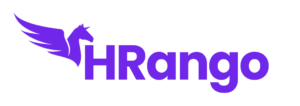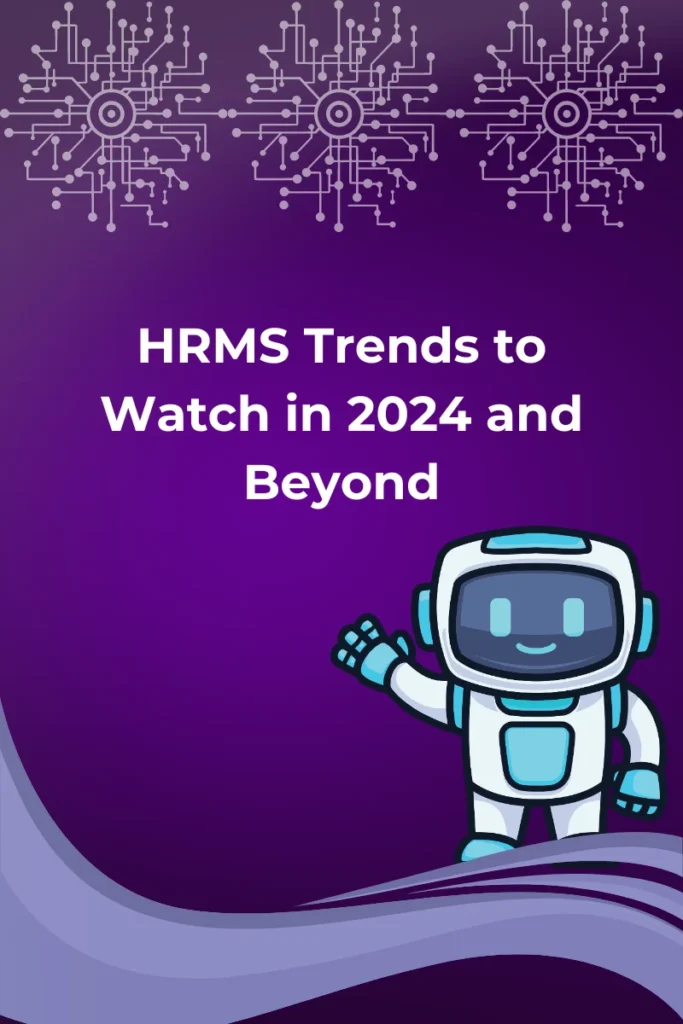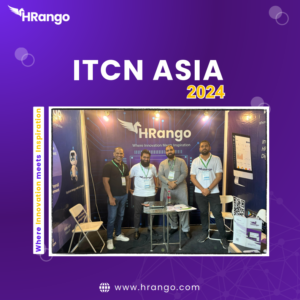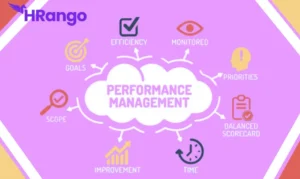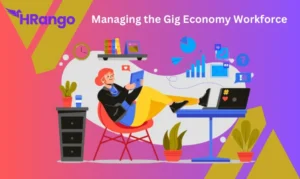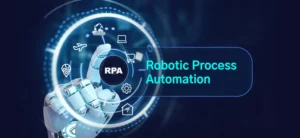The landscape of Human Resource Management Systems (HRMS) is continuously evolving, HRMS trends are driven by technological advancements and changing workforce dynamics. As organizations strive to improve efficiency and employee satisfaction, staying abreast of HRMS trends becomes crucial. In this article, we will explore the key HRMS trends to watch in 2024 and beyond, highlighting how these innovations are set to transform HR practices with platform like hRango.
AI and Machine Learning Integration
Artificial Intelligence (AI) and Machine Learning (ML) are revolutionizing HRMS by automating repetitive tasks and providing predictive insights. AI-powered tools can analyze vast amounts of data to predict employee performance, identify potential candidates, and even gauge employee sentiment. Predictive analytics in HRMS platforms like hRango enables HR professionals to make informed decisions about talent management and workforce planning, ultimately leading to better outcomes for both employees and employers.
Employee Experience (EX) Focus
In today’s competitive job market, the employee experience (EX) is paramount. HRMS platforms are increasingly focusing on creating personalized employee journeys, from onboarding to career development. By incorporating features like those in hRango that support employee well-being and mental health, companies can foster a positive work environment. Continuous feedback mechanisms and tools for personal and professional growth contribute to higher engagement and satisfaction levels.
Remote and Hybrid Work Management
The shift to remote and hybrid work models has accelerated the need for HRMS solutions that can manage dispersed teams effectively. Tools for scheduling, task management, and digital collaboration are now integral to HRMS platforms. These tools enable seamless communication and collaboration, ensuring that remote employees remain connected and productive. Flexible work schedules supported by robust HRMS platforms enhance work-life balance, attracting top talent and retaining valuable employees.
Advanced Data Analytics in HRMS Trends
Data analytics has become a cornerstone of modern HRMS. By leveraging advanced analytics, HR professionals can gain deep insights into employee performance, productivity, and engagement. Predictive workforce planning tools help anticipate future staffing needs, identify skill gaps, and optimize resource allocation. Data-driven decision-making ensures that HR strategies are aligned with organizational goals, driving overall business success.
Blockchain Technology in HRMS Trends
Blockchain technology is emerging as a powerful tool for enhancing HRMS security and transparency. By using blockchain, HR departments can securely store and manage employee data, ensuring privacy and compliance with data protection regulations. Blockchain also streamlines payroll processes and benefits administration, reducing errors and increasing efficiency. Additionally, blockchain can be used to verify the authenticity of qualifications and employment history, making recruitment processes more transparent and trustworthy.
Mobile Accessibility in HRMS Trends
In an era where mobile devices are ubiquitous, HRMS platforms are increasingly adopting a mobile-first approach. Mobile accessibility allows employees and managers to access HR services on the go, enhancing convenience and efficiency. Mobile learning and development programs enable continuous skill enhancement, while mobile self-service portals empower employees to manage their HR tasks independently, reducing administrative burdens.
Employee Self-Service (ESS) Portals
Employee self-service (ESS) portals are transforming the way employees interact with HR departments. These portals provide real-time access to HR services, from updating personal information to requesting time off. By streamlining administrative processes, ESS portals enhance employee autonomy and satisfaction. They also free up HR professionals to focus on strategic initiatives, rather than routine administrative tasks.
Gamification
Gamification is becoming a popular trend in HRMS, aimed at boosting employee engagement and motivation. By incorporating game-like elements such as points, badges, and leaderboards, HRMS platforms can make tasks and learning experiences more enjoyable. Reward systems and recognition programs foster a culture of appreciation, while gamified learning and development programs encourage continuous skill improvement in a fun and interactive way.
Cloud-Based HRMS
hRango offers a cloud-based HRMS trends offer numerous advantages, including scalability, flexibility, and cost efficiency. Organizations can easily scale their HRMS platforms to accommodate growth, without significant infrastructure investments. Cloud-based systems also ensure that HR services are accessible from anywhere, promoting remote and hybrid work models. Additionally, these solutions often come with lower upfront costs and regular updates, ensuring that organizations always have access to the latest features and security enhancements.
Compliance and Risk Management
Staying compliant with ever-changing regulations is a significant challenge for HR departments. Modern HRMS platforms are equipped with tools to monitor and ensure compliance with local, national, and international laws. Automated compliance features reduce the risk of human error, ensuring that organizations adhere to regulatory requirements. Risk management tools within HRMS platforms also help identify and mitigate potential risks, safeguarding the organization and its employees.
Integration with Other Business Systems
Seamless integration with other business systems, such as Enterprise Resource Planning (ERP) and Customer Relationship Management (CRM), is becoming a critical feature of HRMS platforms. Integrated systems create a unified data ecosystem, facilitating better interdepartmental collaboration and data sharing. This integration enhances overall business efficiency, as HR data can be used to inform broader organizational strategies and decisions.
Talent Acquisition and Retention
Attracting and retaining top talent remains a top priority for organizations. HRMS platforms are increasingly incorporating AI-driven recruitment tools that streamline the hiring process. These tools can analyze resumes, conduct initial screenings, and even engage candidates through chatbots. Enhancing the candidate experience is crucial, and HRMS platforms provide tools for personalized communication and efficient onboarding. Retention strategies, such as career development programs and employee engagement initiatives, are also supported by modern HRMS platforms.
Learning and Development (L&D)
Continuous learning and development are essential for employee growth and organizational success. HRMS platforms are incorporating personalized learning paths, tailored to individual employee needs and career aspirations. Virtual and augmented reality are being used to create immersive training experiences, making learning more engaging and effective. A culture of continuous learning is fostered through accessible and relevant development opportunities, supported by modern HRMS platforms.
Conclusion
The future of HRMS trends is dynamic and filled with innovation. The HRMS trends outlined above are set to transform HR practices, making them more efficient, engaging, and data-driven. As organizations navigate the complexities of the modern workplace, adopting these trends will be crucial to staying competitive and ensuring the well-being of employees. Embracing these advancements will not only enhance HR operations but also contribute to overall business success.
FAQs
What is the impact of AI on HRMS?
AI enhances HRMS by automating tasks, providing predictive analytics, and improving decision-making processes.
How can HRMS improve employee engagement?
HRMS platforms improve engagement through personalized employee journeys, continuous feedback, and well-being support.
What are the benefits of mobile HRMS solutions?
Mobile HRMS solutions offer on-the-go access, enhance convenience, and support remote and hybrid work models.
How does blockchain enhance HRMS security?
Blockchain ensures secure data management, streamlines payroll processes, and verifies the authenticity of qualifications.
Why is data analytics important in HRMS?
Data analytics provide insights into performance, productivity, and engagement, enabling data-driven decision-making and strategic planning.
